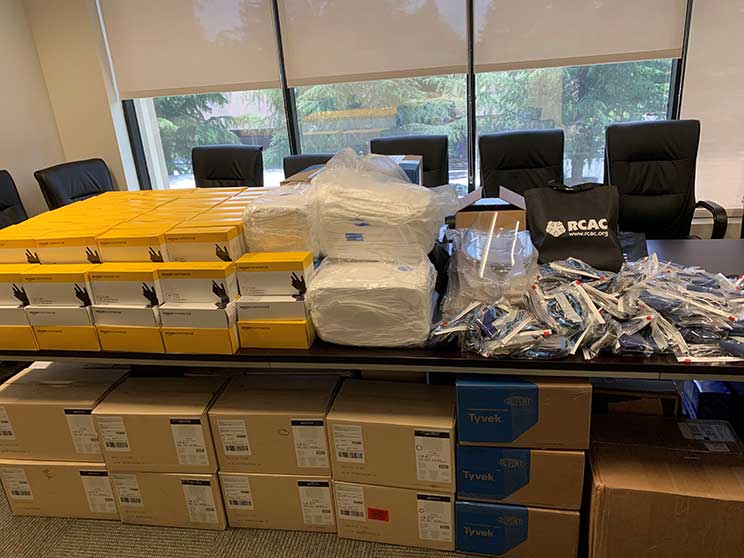
By Louis Martin, RCAC staff writer
A generous Bank of America grant is allowing Rural Community Assistance Corporation (RCAC) to procure and distribute personal protective equipment (PPE) to rural water and wastewater systems.
In May, the Center for Disease Control and Prevention released new data showing that the virus that causes COVID-19 has been found in wastewater samples, which created a large demand for PPE among wastewater operators and water operators that work with untreated water. RCAC prioritized regions with high rates of COVID-19, and communities that already lacked access to piped water and are forced to haul it across great distances. These regions included the Navajo Nation, rural Washington, and rural California.
Once RCAC received the funding, Kristin K’eit, regional field manager, and Lori Blau, rural development specialist II, took on project management. Each has experience with emergency response and Blau has direct experience with wastewater operations. They faced the challenging task of trying to secure PPE, which had become one of the most valuable commodities in the country. As Blau says, “I started combing the internet looking for PPE because it’s in short supply.” While she initially went to major manufacturers, Blau said it was difficult to even make contact.
In addition to sourcing, the team had to determine how to maximize funding to outfit as many operators as possible with high quality PPE. They set a goal to outfit 400 wastewater treatment operators and 200 drinking water operators. The two groups would receive different “kits” with PPE that is applicable to their work and the potential risk of contracting the virus while doing that work.
The wastewater operators received four cloth masks with an antimicrobial lining good for up to 30 hot water washes, a clear plastic face shield, a box of 100 gloves and a Tyvek suit. Water operators received two washable cloth masks and a box of 100 gloves. After scouring the Internet to find affordable equipment, the team found high quality, antimicrobial masks from Buck Mason, a Los Angeles based menswear company that has pivoted to manufacturing masks. Blau placed a bulk order for 1,750. K’eit sourced another 200 cloth masks from a small business in rural Colorado called Kady’s Kollars, which transitioned for about three months from making dog collars to double layer cloth masks due to COVID-19.
“These small utilities, they’re not the big boys. They have a limited ability to get some of these things.” ~Lori Blau, Rural Development Specialist II
For gloves, both Blau and K’eit had to get creative while ordering from an online retailer that placed order limits on individuals and did not have an option for bulk commercial ordering. They had to each place maximum orders separately.
K’eit and Blau sourced face shields from Oscar Romo, founding director of Alter Terra, a nonprofit organization in California, which had begun manufacturing the shields from recycled plastic material.
Protective suits were the most challenging, as the demand was extraordinarily high. Blau found 400 very large (XXL and XXXL) sized suits from a commercial seller. While smaller sizes were virtually impossible to find, Blau reasoned that large suits could be taped up to make them secure.
Blau developed flyers that go in the kits to explain how the PPE was funded, what is in the kit, and care instructions for the face masks and face shields. Other items are single use PPE.
Procurement would prove to be just the first part of the project. Next was assembling hundreds of PPE kits to ship. RCAC’s Keri Pringer, administrative specialist, took the lead. With no playbook to work from, Pringer had to come up with her own assembly line system to sort the hundreds of boxes that began arriving at the RCAC office in West Sacramento.
RCAC has enacted strict social distancing rules for its office staff, meaning that Pringer worked alone in the office, but made use of empty conference rooms to set up a makeshift production area.
“Trying to pack everything, and finding space, that was difficult. Some of the stuff is very heavy, and we have weight limits for shipping,” Pringer said.
Pringer estimates that she has already assembled and shipped close to 150 kits to nine Tribes and has six more Tribes and 50 kits to go.
The final project step will involve thorough training for water and wastewater operators on proper PPE use. RCAC’s Ron Sundberg and David Hossli will coordinate a series of online trainings. Trainings will be specialized for both water and wastewater operators, and the team is discussing submitting the training to state regulators for continuing education credits. The trainings will cover how to safely wear, remove, clean and care for PPE.
The Bank of America grant made it possible to get gear to small utilities that may very well have not gotten access otherwise.
“These small utilities, they’re not the big boys. They have a limited ability to get some of these things. The utilities that have reached out to me have really appreciated it,” Blau says. “They have limited staff and staff hours, so most utilities aren’t able to send someone across a state to pick up FEMA-provided masks. Then, financially, they’re even more limited and not necessarily able to buy what they need online or afford the shipping.”
